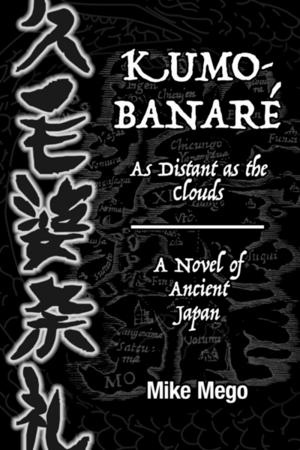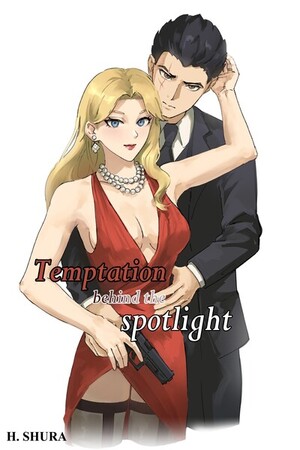Chapter 2:
Tama-shizumé
Kumo-banaré: As Distant as the Clouds
Muna silently cursed her luck.
Though she had hunted her fair share of deer before the one whose carcass lay at her feet now, she had never had the blessing of such a magnificent stag as this. And yet, when she needed her arm the most, it had failed her. Missing that first shot meant sure failure for most hunters; she was only lucky in that she had the facility of powers beyond her own body, to wit, the mist-trick which still lingered thick in the air. She cursed her luck—not the one-time luck of killing a prize stag, but the luck which she constantly leaned on as a crutch.
But this was not the time for negative thoughts. This creature’s spirit had to be pacified before she could carry on with its flesh. She stooped down, letting her bear-pelt cape scrape the ground, and plucked her arrows from the stag’s body; one from its lung, the other from its heart. She returned both bow and arrows to the satchel which was strapped high across her back. Then, clasping her hands together, she bowed, letting her chest touch her knees.
In a hushed, deep voice she began to chant again. The words of this chant Muna would not likely think bore repeating here; indeed, it was less words and more a collection, a string, of syllables.
“A-we-ya-mi-ho-si-tu-no…”
…it began, and droned on for what felt like a whole half an hour. For all she knew, it did absolutely nothing. But she had learned it from her father, the same father who had taught her the mist-trick; she could not deny his wisdom.
Finally, her voice reached the end—not a single slip-up nor stutter. With all the hunting this girl had done, of game big and small, the soul-pacifying ritual was as rote to her as building a fire or washing her clothes in the river. Or gutting a deer, which was the next step to be taken before this stag began to bloat and fester. From her hip Muna retrieved her knife. Some might have found it curious that the whole knife was stone—both handle and blade proper. Hewn from a single rock, this itself must have been quite the labor of love, whether it was from Muna herself or whomever had gifted her the knife.
Working steadily but swiftly at the deer’s skin and bone, Muna’s right arm became the sole focus point of her mind. She was determined, as she was every time, not only to respect the creature whose life she had claimed, but to respect herself by providing herself with the best meat she could make by her own hand. The hunt itself had some factor of luck; this did not. After cutting and splitting open the deer’s entire underside, she reached in and took out the first organ: the heart.
As Muna beheld the heart, something appeared in her periphery that, whether she wanted to or not, made her finally divert some attention from her work. The mist, which had provided them some privacy as Muna watched over the deer’s final moments, had begun to subside. The whole forest became more lucid—or at least, what she could see of it. For right in front of her there was only a sparse row of trees; to her surprise, she had pursued this stag all the way to the wood’s edge. Farther, much farther beyond that, though it would take a little time before it could be called “lucid”, was the impression of a dark palisade of thick oak trunks.
Another settlement—Yamato land. It had to be Yamato, for neither the Hayato nor the Kumaso had such splendid defenses around their own settlements, on the occasion they had built a settlement at all. She would avoid it.
There was a saying Muna had heard passed around the Hayato bonfires: Let your body be rent into four hundred pieces before you walk within twenty paces of a Yamato village. Muna was certainly not as hostile towards the Yamato as this sentiment affected; she did not remember bitterly the few times she had mingled with Yamato travelers while making her way through mountain trails or resting by creeks. What she was hostile towards was the image the Yamato—most Yamato, rather—had of themselves. Her father having been the only person she knew for more than a few days of the first ten years of her life, she had grown up under the notion that what group a person belonged to was determined by the language they spoke. By this standard, Muna’s father could have been Yamato, Hayato, or Kumaso—maybe even Emishi or Kara. She never got a straight answer on that, but Yamato, the language he had spoken the most, was a safe bet.
Then, after speaking with a traveling Yamato family on her own for the first time, after departing from the Hayato village her mother lived in and she had stayed in, she learned the ugly truth of what it meant to be Yamato. “Hayato!” the children called out upon first seeing her. Muna defended herself, speaking Yamato just as fluently as the other party could. But they, and especially the father, were not convinced; he asked her what “clan” she belonged to, what “god” she prayed to, what “village” she was born in, what “tunes” and “poems” she knew, and on and on. Muna felt like she was being pinned to a tree by this man’s barrage of questions. From that day on she knew she was not a Yamato. She would not go near this settlement.
Once she had finished gutting the deer, she planned to turn back and return to her camp, which was deeper in the woods, along a path only she could trace. The route she and her prey had taken was still fresh in her mind, but, like this stag’s insides, it could spoil away if she did not hurry. Not even placing the heart down, she reached inside with her other hand and grabbed the liver. Both of these could be saved for later. While she stuck them inside a small skin-pouch, she ran through the course she had taken over and over again in her head.
North four hundred paces.
North-east two hundred paces.
North-west six hundred paces.
East two hundred and fifty paces.
North four hundred paces.
North-east two hundred paces.
North-west six hundred paces.
East two hundred and fifty paces.
North four hundred paces.
North-east two hundred paces.
North-west six hundred paces.
East two hundred and—
“HALT!”
A voice—a man’s voice, a Yamato’s voice—rang even through the damp air of the clearing. Muna was startled, but she did not immediately turn around. Instead, she listened for what followed this shout: two pairs of footsteps, coming closer. Now she permitted herself to look and see who was causing this disturbance.
Two young men dressed chiefly in white were approaching, still some fifty paces away, from beyond the curve of the palisade’s wall. Both had their hair kept long, tied into massive knots just behind their ears on both sides. The one in front, thinner and younger, extended out the glistening iron tip of a long spear, at least eight spans by Muna’s reckoning. The other man, older and more sturdily built, followed behind, his hand ready by the sword hung in a bamboo scabbard from his belt.
Conflict. Though Muna’s instincts were perfectly primed for it, there was still something utterly tasteless about it to her. Perhaps it was because she would never even dream of a time where she would have to use her fellow man as her sustenance, and thus have to kill him. In any case, hoping her words could disarm these ruthless watchers of whatever gripe they had against her, she wiped the stag’s blood from her knife with her cape and stuck it back in its leathern sleeve.
What these men would do next she could not divine, but she had a good guess.




Please sign in to leave a comment.